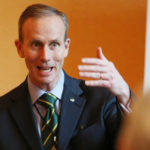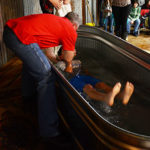Posted 6/30/03
Healthy churches rest on seven pillars, consultant says
By Marv Knox
Editor
CHARLOTTE, N.C.–Although every church is unique, healthy congregations tend to reflect seven characteristics, a veteran church consultant insisted.
Les Robinson, vice president of the Center for Congregational Health in Winston-Salem, N.C., described those seven characteristics to participants in a seminar during the Cooperative Baptist Fellowship general assembly.
Building on research developed by Peter Steinke, a Lutheran minister and church-systems specialist, Robinson said healthy churches:
Set boundaries. Church members, clergy and laity alike, do not "get into other people’s relationships," try to speak for the entire group or talk about others without speaking directly to them, he said.
![]() Take responsibility. Members of healthy churches are wiling to take stands on important congregational issues, he said.
Take responsibility. Members of healthy churches are wiling to take stands on important congregational issues, he said.
"They’re willing to say, ‘This is where I am’ on a particular issue," he said. This approach contrasts with unhealthy churches, where clergy and laity refuse to acknowledge their positions or beliefs, thus confusing the situation and causing conflict.
![]() Have resiliency. The challenge is to remain rooted and centered on principles but also to be flexible to changing circumstances and new opportunities, Robinson said.
Have resiliency. The challenge is to remain rooted and centered on principles but also to be flexible to changing circumstances and new opportunities, Robinson said.
Sign up for our weekly edition and get all our headlines in your inbox on Thursdays
"Without resiliency, there is no creativity," he said. "It’s not that tradition is bad, but if everything is determined by tradition, we’ll never add anything to it."
Creativity also helps churches recover from trauma by enabling them to adapt to new circumstances.
![]() Practice clarity. "Some churches don’t know where they’re headed," he lamented. "You must have a mission or vision. With a mission and vision, there is very little (church) conflict, because you know where you’re going."
Practice clarity. "Some churches don’t know where they’re headed," he lamented. "You must have a mission or vision. With a mission and vision, there is very little (church) conflict, because you know where you’re going."
![]() Read mood or tone. This quality helps churches head off trouble before it develops, Robinson said.
Read mood or tone. This quality helps churches head off trouble before it develops, Robinson said.
Church leaders who can see ahead far enough to "know when trouble’s coming" are able to manage conflict more effectively than those who are surprised by apparently sudden conflict, he noted.
Likewise, leaders who deal with elements of change in advance help their churches process the shifting circumstances reasonably well.
![]() Negotiate conflict. While most people avoid conflict because it is painful, wise church leaders learn to balance conflict and derive creativity from the tension that results.
Negotiate conflict. While most people avoid conflict because it is painful, wise church leaders learn to balance conflict and derive creativity from the tension that results.
In fact, healthy churches need both times of comfort and times of tension, Robinson said. "If we’re always comfortable or always in tension, we’re not going anywhere. We need healthy stress."
![]() Develop leadership. "Every congregation needs ‘stewards’ who will manage and care for the group," he said.
Develop leadership. "Every congregation needs ‘stewards’ who will manage and care for the group," he said.
In fact, leaders are like the "immune system" that protects the church from disease.
Healthy church leaders understand their roles and function responsibly, he said. They also focus on the church’s strengths, resources and options.
In time of crisis and trauma, healthy church leaders remain calm and reflective, rather than react in panic, he added. They always are in process of assessing the church’s situation, preparing for the future.
They also accept and deal with anxiety, help the church clarify its situation and its mission, and they maintain relationships with church members who are anxious because of threatening circumstances or others who are opposed to change.
See related stories:
• CBF: Churches should talk about 'mission' rather than budget to overcome shortfalls
• CBF: Vestal: Diversity must express itself in common stream of witness
• CBF: Youth ministries need to enlist, affirm parents
• CBF: Campolo urges 'Fight the good fight' for justice
• CBF: Healthy churches rest on seven pillars, consultant says
• CBF: Leonard says Baptists 'bog down' relating to people of other faiths
• CBF: Currie calls Patterson statement on women in the pastorate 'arrogant'
• CBF: Missionary couple says they're grateful to serve at all after being fired by IMB
• CBF: Anonymous gift will allow CBF to appoint missionaries despite budget shortfalls















We seek to connect God’s story and God’s people around the world. To learn more about God’s story, click here.
Send comments and feedback to Eric Black, our editor. For comments to be published, please specify “letter to the editor.” Maximum length for publication is 300 words.